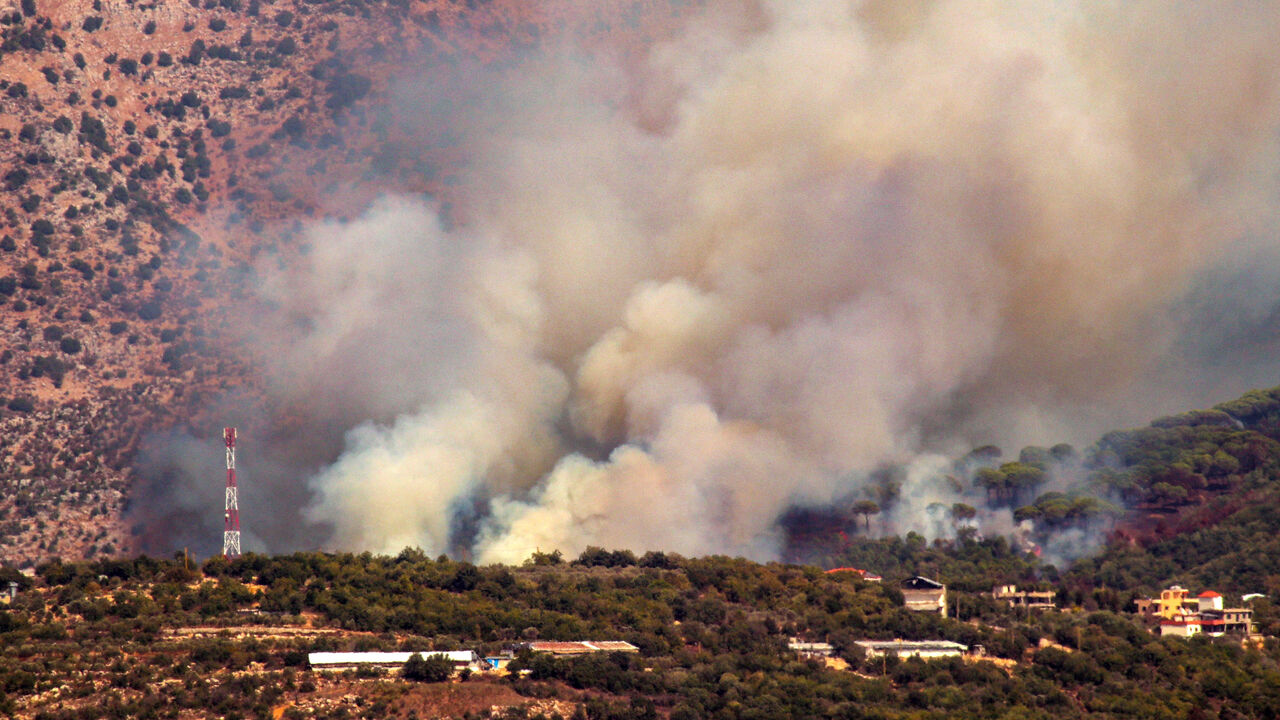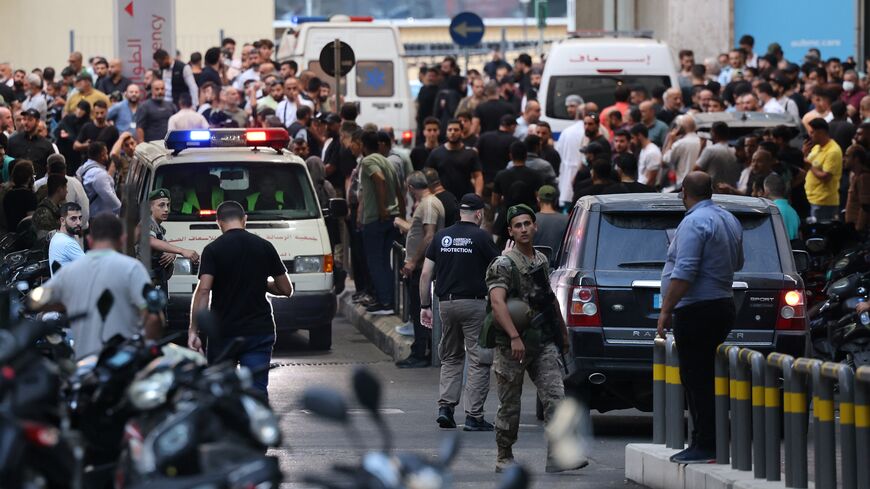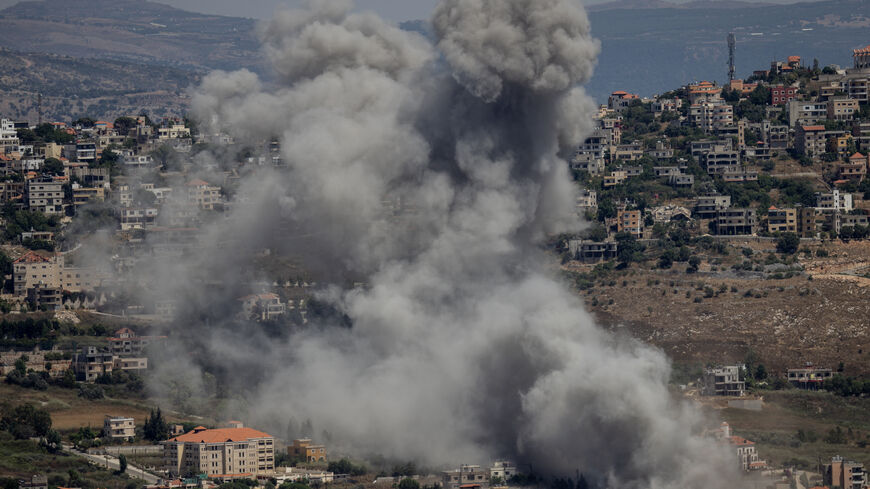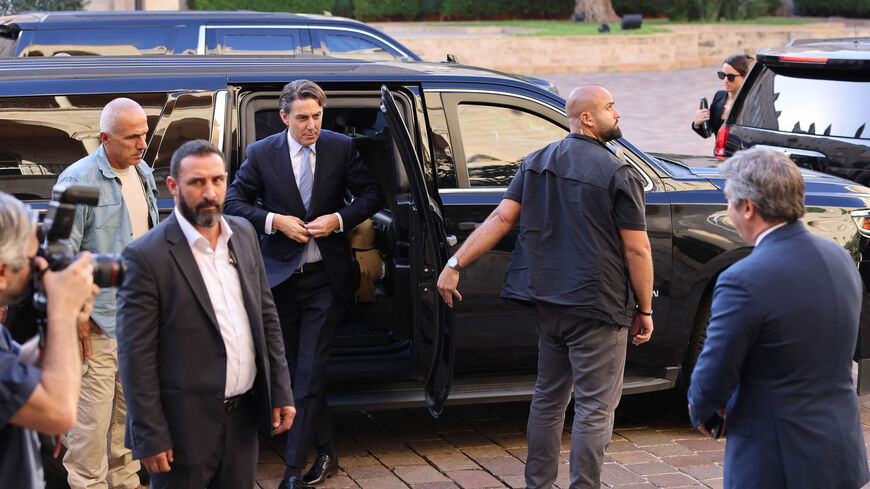Amos Hochstein arrives in Israel in latest US effort to avert Lebanon war
A renewed feud between Prime Minister Benjamin Netanyahu and his defense minister could throw a wrench into the mission of Biden's envoy Amos Hochstein as he arrives in Israel to avert a full-blown Israel-Hezbollah war.

Israeli leaders are ramping up threats to launch a military offensive into Lebanon amid a new diplomatic visit by Amos Hochstein, Washington’s top envoy tasked with averting a war between Israel and Hezbollah.
Hochstein was set to meet separately with President Isaac Herzog, Prime Minister Benjamin Netanyahu and Defense Minister Yoav Gallant on Monday in an effort to persuade Israeli leadership against launching a large-scale military operation against Hezbollah.
Since Oct. 8, the Israeli military has been retaliating against rockets and drones launched by Hezbollah, but did not engage in a full-out war against the group. Still, Israel killed in Beirut Hezbollah's military commander Fuad Shukr July 30 and launched a preemptive attack against Hezbollah targets in Lebanon on Aug. 24 after evaluating that the group was preparing a mass rocket and missile attack against Israel.
The US envoy is expected to travel next to Beirut, where he’ll meet with Lebanese government interlocutors who will coordinate with Hezbollah.
Hochstein has pushed a multi-point plan that aims to see Hezbollah pull its forces back several kilometers from the border followed by the deployment of Lebanese army forces and international peacekeepers with eventual land swaps to defuse hostilities over the border zone.
US officials have suggested diplomatic efforts to avert an Israeli-Hezbollah conflict are likely to outlast the war in Gaza, but it remains unclear how the confrontation can be avoided without a cease-fire in Gaza.
Hezbollah leaders have repeatedly said they will not halt their drone and rocket attacks into Israel until the war in Gaza ends, but a US-led push for a cease-fire appears to have bottomed out, with Netanyahu pushing for indefinite military control of parts of key areas of the Palestinian enclave.
Yet the Israeli military leadership has voiced disagreement with Netanyahu's plan as it increasingly turns its focus to preparing to confront the far greater arsenal of Hezbollah to the north.
Netanyahu-Gallant rift
Last month, the prime minister opted against direct strikes in Beirut to preempt an anticipated Hezbollah attack instead ordering a wave of airstrikes within kilometers of the border to thwart a Hezbollah response to Israel's assassination of the militia's top commander.
Yet Gallant expressed pessimism over the possibility of reaching a deal with Hezbollah, Ynet reported Monday. Speaking at a closed security meeting with Netanyahu at the Defense Ministry headquarters in Tel Aviv, Gallant reportedly said, "The whole time, I was saying either escalation or a settlement [with Hezbollah], but it is no longer possible to reach a settlement."
Gallant stressed, "There is only one possibility, which is going with all the might and using all of our military force, in order to enable the residents of the north to go home."
Last Thursday, Netanyahu told the ministers overseeing security agencies, “The situation in the north cannot go on. We must shift the balance and we must bring back the residents. This cannot happen without changing the balance vis-à-vis Hezbollah,” according to Ynet.
“The Israeli military must prepare for a large-scale campaign in Lebanon,” the prime minister told Gallant, Strategic Affairs Minister Ron Dermer, Foreign Minister Israel Katz and Finance Minister Bezalel Smotrich in the closed-door Thursday meeting.
Gallant echoed that warning to US Defense Secretary Lloyd Austin during a phone call early Monday, saying time was running out to reach resolution on Israel’s northern front, according to a readout released by Gallant’s office.
The Israeli defense chief reiterated that his military is committed to pushing Hezbollah back from the border, renewing a nearly 11-month-old threat that has yet to be put into action.
Tensions between Netanyahu and Gallant have increased significantly in recent weeks, with the Israeli media reporting Monday that the Israeli premier intends to fire Gallant and replace him with New Hope leader Gideon Sa’ar. The office of Netanyahu denied Monday afternoon, he was holding talks with Sa’ar for joining his cabinet.
Relations between Netanyahu and Gallant soured last year, after the defense minister called to suspend the judicial overhaul for eroding the powers of the courts. Netanyahu fired Gallant March 2023 over the statements, but was forced to reinstate him following a public outcry.
Netanyahu and Gallant disagree on several issues, including the management of the Gaza war, the tensions in Lebanon and the drafting of ultra-Orthodox. Far-right National Security Minister Itamar Ben-Gvir posted Monday on X, "For several months I have called on Prime Minister Netanyahu to fire Gallant," and "We must make a decisive move in the north, and Gallant is not the right man for the job."
Gallant has been calling to reach a diplomatic agreement with Hezbollah, while stressing that the military is preparing for any possibility. Judging by his statements in the past week, including his conversation with Austin, Gallant is no longer sure a diplomatic solution is currently feasible.
At least 90,000 Lebanese citizens and more than 60,000 Israelis remain displaced from their homes near the border following evacuations amid tit-for-tat exchanges of lethal fire.
“Hezbollah continues to tie itself to Hamas. The direction is clear,” Gallant’s office quoted him as saying in the discussion with Austin. The Pentagon had not yet confirmed the call as of publication time.
Head of the Israeli military’s Northern Command, Maj. Gen. Ori Gordin, has suggested to Israeli leaders during private meetings that the military be authorized to launch an incursion into southern Lebanon to set up a buffer zone, Israel Hayom newspaper reported on Monday.
Gordin reportedly argued that Hezbollah’s elite Radwan forces near the mutual border have been softened by waves of Israeli strikes in recent months and that many of their forces had withdrawn, making the opportunity ripe for an Israeli offensive.
US officials have consistently opposed an Israeli offensive in Lebanon out of concern it could trigger a massive Hezbollah retaliation that could spiral into a wider regional conflict by drawing in other Iran-backed militias in Iraq and Syria, and potentially Iran and the United States.
The Iran-backed militia is estimated to have amassed at least 150,000 rockets and precision-guided drones since Israel’s last war in Lebanon, more than 10 times the estimated arsenal it had during the last war with Israel, which led to a unilateral Israeli withdrawal from Lebanon.
Leaflets dropped over Lebanese town
On Sunday, leaflets were dropped over a Lebanese border town urging its residents to evacuate.
“The Israeli enemy dropped leaflets over Wazzani calling on those in the area and its surroundings to evacuate,” Lebanon’s National News Agency reported.
“To all residents and refugees living in the area of the camps, Hezbollah is firing from your region. You must immediately leave your homes and head north of the Khiam region before 4 p.m.),” NNA reported.
The Israeli military later told AFP that a brigade had taken the initiative to drop the leaflets without prior approval.
On Sunday night, the Israeli military said a few soldiers were injured by drones that fell in the Golan Heights, without giving the number of wounded. Hezbollah fired dozens of rockets and drones at Israel, sparking fires and causing damage to buildings.
A drone launched from Lebanon Monday started a fire in the north of Israel, but no injuries were reported. In response, the Israeli military struck several Hezbollah targets in Lebanon. The Druze village of Majdal Shams, where 12 children were killed July 28 by a rocket launched by Hezbollah, announced it was closing schools for two days because of the security situation.








